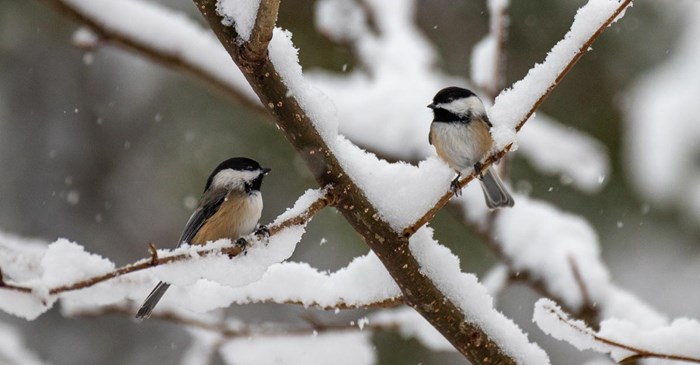Great birdwatching isn’t limited to summer, or those times when birds are migrating. During the cold-weather months, chickadees keep themselves pretty busy. Here are some things to keep an eye out for when you’re out and about this winter.
Chickadees have followers
Like most other northern birds, chickadees survive the winter by foraging in groups with other chickadees for seeds, nuts, bits of dried fruit — anything that’s still clinging to a stem or twig. But they’re not always alone. If you come across a buzzy bunch of chickadees hopping around in the trees and brush, look for other bird species quietly tagging along, especially nuthatches, Downy Woodpeckers, Tufted Titmice, Brown Creepers, and kinglets. These birds like to follow the small, social chickadees, who do the work in finding the best food sources.
This doesn’t mean they’re a tight flock that sticks together all winter. But as the chickadees move from place to place, a few of these birds will follow. By turning to the chickadees to take the lead, nuthatches, woodpeckers, and other birds gain some advantages:
Chickadees are bold and curious. If you’ve ever set out a feeder, and noticed chickadees were among the first to find it, you might understand why other birds look to these explorers as a resource. You might even see this playing out at your feeder. As they eat, watch and see if they’re joined by a woodpecker or nuthatch.
Traveling together offers safety in numbers. This is critical when predators are about. Though they may be competing for some of the same foods, joining a small flock reduces the odds the individual will be targeted.
Chickadees are good watchmen for danger. When a chickadee spots a predator — such as an owl roosting in a tree or a hawk circling overhead — they’re the first to send out a warning call, and other bird species pay heed to it. You may hear what seems like a standard “chicka-dee-dee” call. But researchers determined chickadees add several extra “dees” to their calls to indicate warning and danger.
Keep the foraging flocks fed this winter by filling your feeder with Lyric Chickadee Mix. Filled with high-protein sunflower seeds, shelled peanuts and pistachios, there’s plenty to keep these lively birds coming through the cold winter days — as well as a few of their feathered friends.
